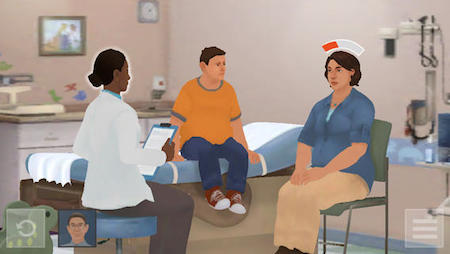 New York City-based patient engagement company Kognito has partnered with the American Academy of Pediatrics (AAP) Institute for Healthy Childhood Weight (IHCW) to create an app that addresses childhood obesity, called Change Talk: Childhood Obesity.
New York City-based patient engagement company Kognito has partnered with the American Academy of Pediatrics (AAP) Institute for Healthy Childhood Weight (IHCW) to create an app that addresses childhood obesity, called Change Talk: Childhood Obesity.
"The goal of the app is really to help healthcare professionals who work with pediatric populations to know how to manage challenging conversations with their family around changes in their behavior," Kognito CEO Ron Goldman told MobiHealthNews. "This could be anything from diet to exercise to screen time. Really anything revolving around risk factors of obesity."
The app helps physicians practice talking to patients and their parents about childhood obesity using motivational interviewing (MI), an evidence-based patient-focused technique meant to use motivation to change a patient's behavior. So far, the app only provides one situation that physicians can play through, but Kognito plans to work with the AAP to add more situations to the app.
In this first situation, the physician is talking to a mother and her overweight son about changing the child's daily regimen so that he can be healthier. The mother is also grappling with her own health issues so she is unwilling to admit her son might also have the same problems and the son has been bullied at school because of his weight and feels sensitive about the topic.
As the physician talks to the virtual patients, he or she can see a status bar over the patients' heads that shows whether the conversation is providing the patients with motivation to change. Patients will also change their facial expressions based on how the conversation progresses. If the conversation didn't go well, physicians can also hit the undo button and try a different approach. The conversations are meant to last about five minutes, which Goldman said is typical of these types of appointments.
Although this conversation is very specific, Goldman said the tactics that physicians are learning in the sessions can be generalized and applied to many more situations. The next situation that Kognito plans to add to the app will be direct to consumer.
"What we already hear a lot is the need to look at the patient and caregiver and the challenging conversations that they need to have within the family and with others around making the changes," Goldman said. "I think if I had to make a guess, I would say that the next conversation will look at the consumer or the caregiver as a role that you assume in the conversation. For example, in this one you talk to the mom and son at the pediatrician's -- ok you've convinced them to make the change. The mom goes back home, she starts talking to her husband about, 'Ok, we need to make this change, we can't drink so much soda, we've got to get the kids to start exercising, we've got to buy different types of food and more vegetables, and turn off the TV,' and the husband is like, 'Not going to happen.' What do you do?"
Goldman said Kognito has had positive experiences working on apps that help caregivers and non-medical professionals, like training military families to talk to their veteran about PTSD.
Unlike Kognito's other apps, Change Talk is free and will stay free, even if the company decides to add more situations. Other Kognito apps can be licensed to a physician's practice or are available on Kognito's online store. The apps currently available in the store range from $25 to $56 and cover topics like helping educators deal with at-risk children and an app focused on training principals, which was created in partnership with The New Teacher Project, an organization that aims to bring good teachers poor and minority students. The VA has also licensed one of Kognito's programs.












